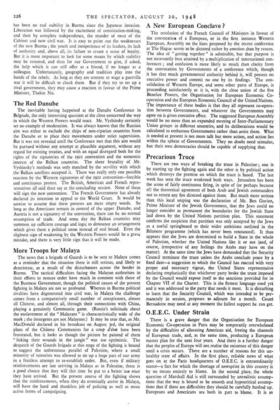The Red Danube
The inevitable having happened at the Danube Conference in Belgrade, the only interesting question at the close concerned the way in which the Western Powers would react. Mr. Vyshinsky certainly set no example of moderation. It was always known that the Russian aim was either to exclude the ships of non-riparian countries from the Danube or to place their movements under strict supervision. But it was not revealed until the Conference met that this aim would be pursued without any attempt at plausible argument, without any regard for existing treaties, and with an equal disregard both for the rights of the signatories of the 1921 convention and the economic interest of the Balkan countries. The sheer brutality of Mr. Vyshinsky's methods was only matched by the servility with which the Balkan satellites accepted it. There was really. only one possible reaction by the Western signatories of the 1921 convention—forcible and continuous protest. The British, American and French repre- sentatives all said their say at the concluding session. None of them will sign the new convention. The French Government has already declared its intention to appeal to the World Court. It would be unwise to assume that these protests are mere empty words. So long as the Americans remain in control of the upper Danube, and Austria is not a signatory of the convention, there can be no normal resumption of trade. And some day the Balkan countries may summon up sufficient courage and logic to denounce an arrangement which gives them a political stone instead of real bread. Even the slightest sign of weakening by the Western Powers would be a grave mistake, and there is very little sign that it will be made.


































 Previous page
Previous page